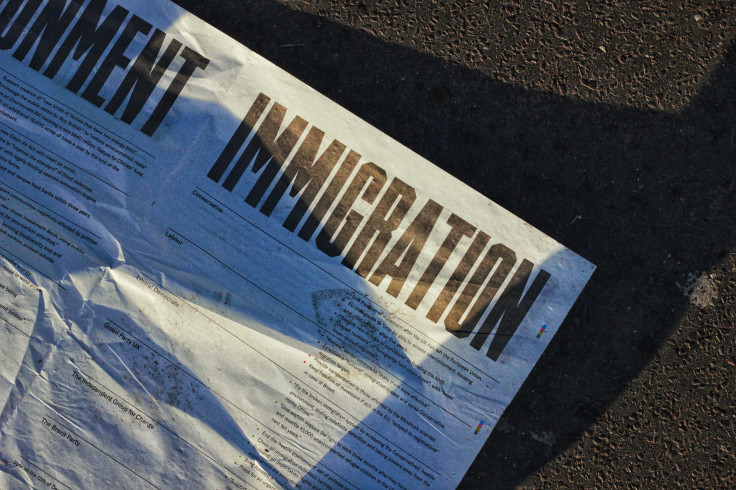UK Government Unveils Sweeping Immigration Changes, Sparking Concerns in Key Sectors
The measures intended to address concerns over immigration levels, particularly in the healthcare sector, include a substantial increase in the minimum salary requirement for skilled worker visas and the elimination of the 20 per cent discount for essential professions.

In a pivotal move aimed at reshaping the UK's immigration landscape, James Cleverly, the home secretary, has introduced a comprehensive package of measures set to significantly reduce the influx of migrant workers and their dependents entering the country.
This far-reaching initiative is poised to make it substantially more challenging for employers, including those in critical sectors like the NHS and social care, to recruit overseas staff.
Outlined as a five-point strategy, this proposal encompasses various alterations, including a substantial increase in the minimum salary requirement for skilled worker visas to £38,700. Simultaneously, the rule permitting certain professions to be hired at rates 20 per cent below the prevailing standard is slated for elimination.
The government forecasts that these measures will result in a marked reduction of approximately 300,000 individuals in net migration annually. This strategic manoeuvre spearheaded by Cleverly and endorsed by Prime Minister Rishi Sunak is an explicit attempt to salvage the Conservative Party's credibility in managing immigration, which has faced scrutiny and wavering public trust.
Yet, amidst these ambitions, experts caution that such stringent regulations risk exacerbating the strain already burdening the healthcare sector and could impede the UK's long-term economic growth potential.
Cleverly articulated in a parliamentary address, highlighted the urgency of curbing migration, stating: "Migration is far too high and needs to come down... enough is enough."
He further announced the unveiling of an all-encompassing five-point plan, aiming to curb immigration abuses, ensuring the most substantial reduction in net migration ever witnessed.
The key facets of this plan involve not only elevating the salary threshold but also abolishing the "shortage occupation list". Additionally, social care workers would be barred from bringing their dependents to the UK. Moreover, sponsorship for family members to move to the UK would now mandate a minimum income of £38,700, a sharp escalation from the existing £18,600 threshold.
Crucially, the government has solicited the Migration Advisory Committee to review regulations concerning individuals who have completed undergraduate degrees within the UK.
Downing Street lauded this package as "the biggest clampdown on legal migration ever", heralding it as a mechanism to substantially reduce numbers while ensuring economic growth. However, this forms just one part of a dual-phased strategy aimed at curbing both legal and illegal immigration. Plans to sign a new asylum treaty with Rwanda signal the forthcoming legislative efforts in this realm.
Reports reveal that Downing Street initially planned a more moderate set of restrictions on legal migration but capitulated under intense pressure from Tory backbenchers and Robert Jenrick, the immigration minister. However, Downing Street refuted claims suggesting the five-point plan mirrored Jenrick's repeated advocacy in recent weeks.
Christopher Howarth, a former Home Office advisor, highlighted previous opposition from departments like the Treasury, which had vetoed similar proposals due to apprehensions about stifling economic growth. He stressed the resonance of these current changes with suggestions made 18 months ago, which were thwarted by internal opposition.
The Home Office's projections indicate a reduction of 300,000 entrants into the UK, including substantial decreases across student routes, health and social care routes, skilled worker pathways and sponsored family members. However, precise estimates regarding reductions in workers versus their dependents remain elusive.
Alarm bells ring louder within the health and social care sectors, already grappling with 152,000 care worker vacancies in England. Industry leaders express grave concerns, citing potential difficulties in recruiting foreign workers and urging swift government action to enhance domestic recruitment by improving pay and conditions.
Critics within the Conservative fold, like George Eustice, critique the inherent flaws in a skills-based migration policy, highlighting preferential access to certain professions at the expense of crucial sectors like care, food industry, manufacturing and tourism.
Notably, these measures resonate with the pre-Brexit immigration framework, resembling a system where skilled non-EU workers primarily required degrees. This shift contrasts with the surge in visas granted to foreign health and social care workers, a figure more than doubling to 143,990 in the year ending September, accompanied by 173,896 dependents.
The Migration Advisory Committee's prior recommendation to scrap the shortage occupation list stemmed from concerns that it was being exploited by low-wage sectors to source cheaper foreign labour instead of investing in domestic recruitment.
Despite promises dating back to 2010 to significantly reduce net migration, the numbers have persisted at high levels, notably rising post-Brexit, with a substantial influx from non-EU countries. This surge contrasts starkly with pledges made during the Brexit campaign about border control, posing challenges for anti-EU factions within the Conservative party.
© Copyright IBTimes 2025. All rights reserved.






















